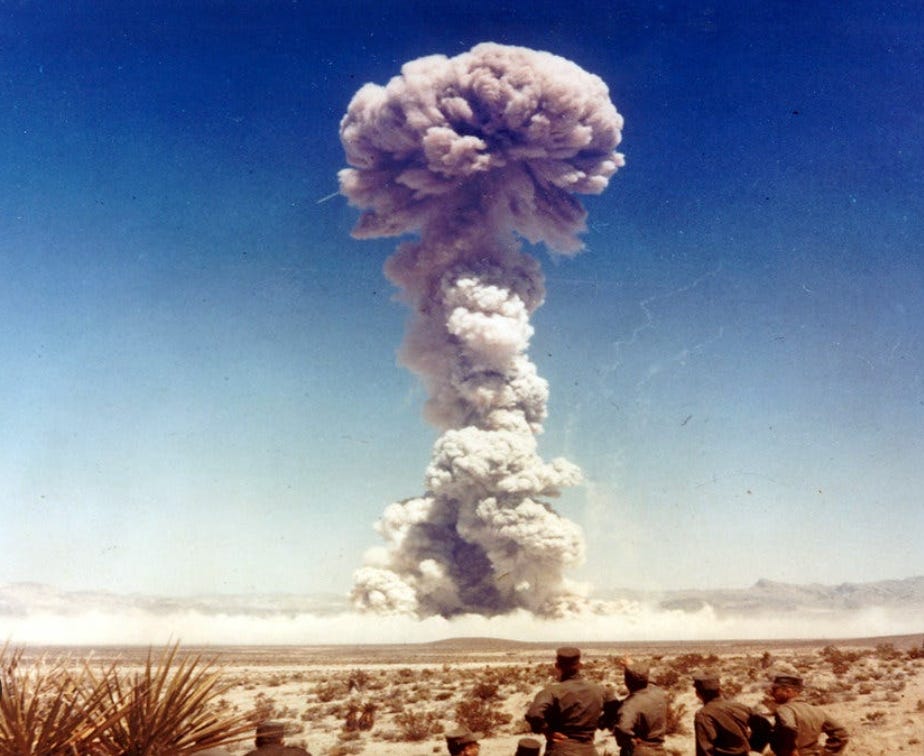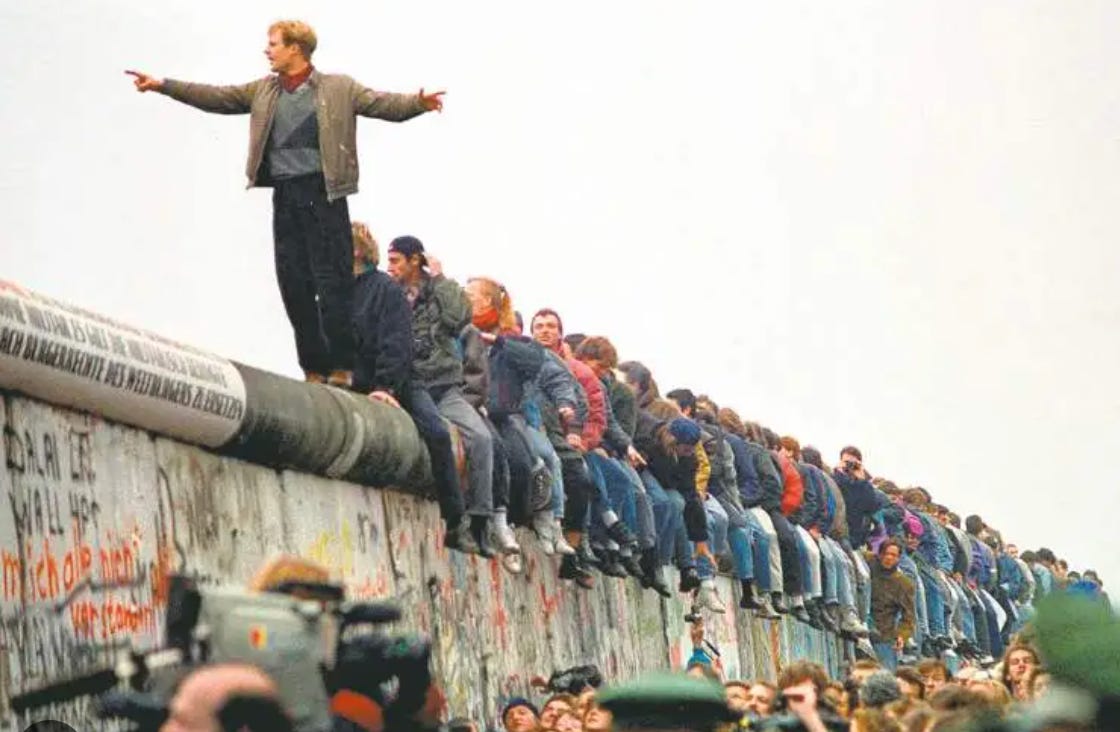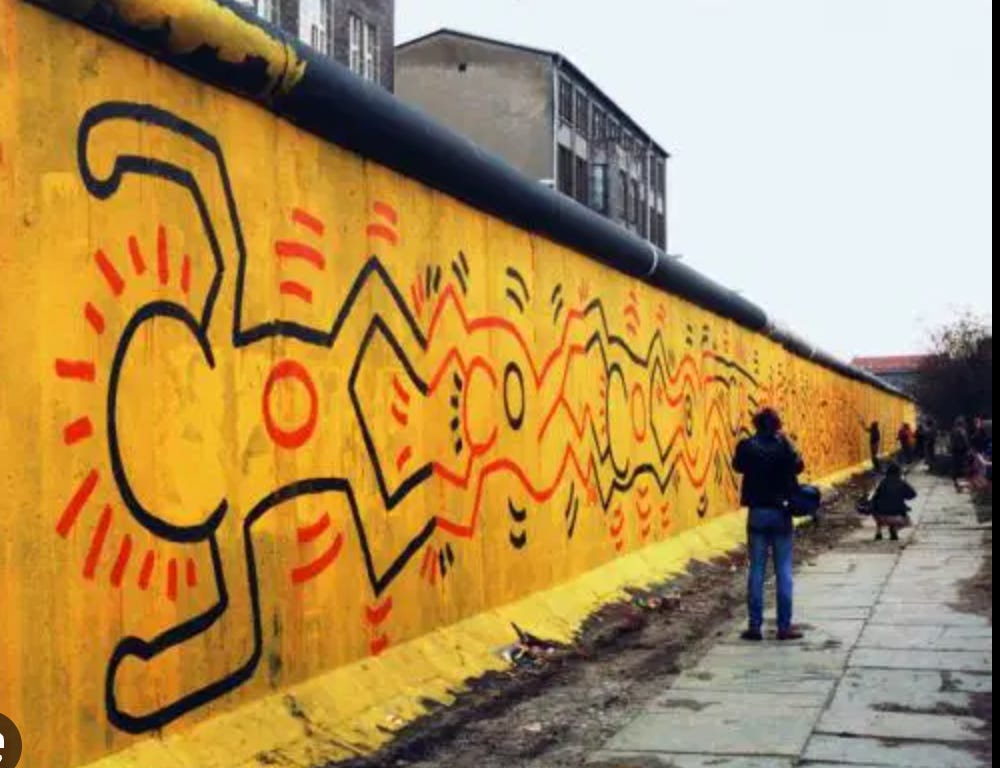You are a kid. From a tiny upstate New York rural village. It’s the 80’s. You look up Center Street, the street that has a house on it that you have lived in for like, most of your childhood. You see the same trees, oaks and maples, big green and leafy things. The same sidewalks you learned to ride your bike on. The one with the banana seat and the high-rise handlebars.
There are train tracks cutting across the street a few houses down. A train passes through there everyday. It carries wood to the mill where your father works shift work, 11-7. He will work there until he can’t work there anymore. You run down to the tracks as soon as you hear the whistle blow. You wave. Whoever is driving the engine leans out the window and waves back. It’s clockwork.
Your best friend’s house is there, too. Around the corner. A place you know as if it were an annex of your own house. You play hide-and-seek there. Eat pot roast at the kitchen table. Watch movies there. And get dressed up for dances, almost as many times as you do in your own house. There are marks on her garage door from where you and she hit the tennis balls against it. Her parents are almost like your parents.
There is freshly cut grass. The low din of mowers. You smell the traces of Love’s Baby Soft on your skin. You bought it at the mall. Malls are cool places to hang. You are happy you have one only a 45-minute drive from town.
Your mother makes you oatmeal cookies, from a recipe on the back of the oatmeal container. They are still warm. They are your favorite. You eat them while watching Luke and Laura get married. You can’t wait to get home from school to watch General Hospital at 3pm every day. Your grandma in her house dress will watch it with you. You’ve heard of MTV, of course. You aren’t a complete bumpkin. But that and Sesame Street are for city kids. Country kids have three fuzzy channels. TV sets in dark paneled dens, bent wire hangers with tin foil coats for antennas.
This is a life. A town. A childhood. Nothing changes all that much. It’s the thing you love, as much as you hate. There is something comforting and predictable about this life. You feel insulated. Like everything is pretty much going to stay this boring forever.
And yet, there are rumblings of dark things happening in the world. Some worries are hyper-local, like whether the mill will shut down and leave the whole town, and your dad, without jobs. You know the adults worry about this. You hear the nervous in their voices.
But there are bigger things brewing, too. You feel it weighing everything down. The news at 6pm every night. 60 Minutes on Sundays after Wild Kingdom. The stories rattle with espionage, distrust and leaked reports. Stand-offs. The Soviets have their missiles pointed at us. We have our missiles pointed at them. Warheads rule the world. You are told there is a button, and all it needs is to be activated.
BOOM.
Reagan calls the Soviet Union The Evil Empire. You take that literally. Are Russians evil? You think they must be. Do they hate us? They must. We should hate them back, right?
The Soviets invade Afghanistan. There are American hostages in Iran. Anti-nuke peace demonstrations break out in big cities across the world. A 10-year-old girl from Maine writes a letter to the Soviets asking them if they are going to hurt us? You want to know, too. Can you trust what any of the grown-ups say anyway?
It’s at this point where you realize the people in charge have no idea what they are doing. Fuck the people in power. Fuck authority. Who are you going to trust?
Russia shoots down civilian airliners. Peace talks start. Peace talks fall apart. Russia calls for peace. The US refuses. Communism is a word you come to know well. Communisim is evil. Democracy is good. You are relieved to be on the side of good. You want to see the world simply. It feels good to be good. You want to pray to win this thing, but you know Russian children are praying to win, too. You cancel each other out. Who does God love more?
The nuclear thing is always there now. Will they nuke you? Will you nuke them? You see the 1973 Pulitzer Prize-winning photo of Phan Thi Kim Phuc running down the road naked. Skin on fire after a napalm explosion. You remember Three Mile island. Chernobyl. Radiation. Cancers. Blisters. Burnt, crisped, raised skin. Slowly encroaching late stage diseases. Dead babies. Disfigured babies. Babies with no limbs. Dead animals. Failed pregnancies.
Dead. Dead. Dead.

Rich people build bunkers. You don’t know anyone with a bunker. But you know a bunker might not save you anyway. In the past, kids were taught to duck and cover, under their school desks. And in New York City, people distributed dog tags to kids at school, with names and addresses, so they could to dentify their remains.
But that was the 50’s. This is modern shit. You know that nothing will save you from a nuke. No one sugar coats it. You come to terms with reality. Scientists talk openly about nuclear winter. You learn that nuclear detonation will kill 80% of us all. You learn: If incineration doesn’t immolate you, if the radiation doesn’t peel off your skin and give you slow-death cancers that rot you from the inside out, the famine will take you quickly.
It changes you. It changes how you sleep at night. What you say to yourself when no one else is around. It changes your friends, your whole generation. I mean, if it can all be blown up and disappear, what’s the point of anything?
Nukes, and collective fears, launch themselves into pop culture. Your fears, everyone’s fears, become art. Grunge. Hip hop rhymes. Alt music. Zines. Street art. MTV. 24-hour cable news. The culture is on fire.
David Bowie, Genesis, the Eurythmics perform in West Berlin at the Wall. The Wall is the physical demarcation of communism meeting democracy. Evil meets good. People listen to the music from both sides, East and West. Music defies walls. It floats over and between them. It cannot be stopped or contained or diminished. Bruce Springsteen performs. Billy Joel performs in Moscow. He writes a song called Leningrad.
A German Band named Nena releases a song that speaks to the fragility of the moment. 99 LuftBalloons is about a balloon that floats on the horizon, is mistaken for something dangerous and unknown. A general over-reacts. The nervous, shivering balloons, floating in the sky, are all that is needed to start a war. This is how precarious it all feels.
Ninety-nine ministers of war
Matches and petrol canisters
Regarded themselves as clever people
Already on the scent of a hunt
They shouted, "War," and wanted power
Man, who would have thought?
That someday it would come this far
Because of ninety-nine balloons
Your movies and books become obsessed with nukes and Russian antagonists: White Knights with Barishnikov and Hines. Moscow on the Hudson, defection fantasies. The Hunt for Red October, Sean Connery, a Russian commander defects from his sub. Red Heat, everyone wants to come to America. Red Dawn, spies. Little Nikita, sleeper spies. Mad Max, complete world-ending dystopia.
And books, even for children. You will read Sadako and The Thousand Paper Cranes, about a Japanese Girl scorched and radiated by the Hiroshima A-bomb. She makes paper cranes in her cancer ward. And When the Wind Blows, a graphic novel about an older couple, who awkwardly and often humorously, build a bunker in England. They succumb to radiation sickness.
It’s bleak, man. But something you are doing is taking shape.
You watch The Day After.
In fact, you and everyone you know watches The Day After in groups, huddled around TV sets. The movie is powerful and terrifying, even though it has been edited back to remove the most distrubing parts. Even President Reagan comes around to the idea that nuclear war is not survivable. He says in a speech: To preserve our civilization in this modern age, a nuclear war cannot be won and must never be fought. Later, your president will sign the Intermediate-Range Nuclear Forces Treaty, committing the US to reducing its nuclear program.
Art defies walls. Reagan urges Gorbachev to TEAR. DOWN. THIS. WALL. The Soviet Union falls.
I remind you of this now so that you will remember your power and your lived experience.
Because you cannot bomb people into making peace or making nice.
Because I saw a thread on X where people were making fun of older folks who turn out to protest. (Fuck them)
Because this week my 14-year-old son walked into the kitchen, the day after we bombed Iran, and asked: Mom, are we going to have a nuclear war?
I want to remind you: We have been here before. And we fucking stopped it. A movie, a script, a book, a demonstration, a rock concert, a song, a photo, a mural, a simple meal to nourish, a hand across the ideogical divide, the gift of grace, a post on your newsletter. It all matters.
We need your Gen X energy right now.
Thank you, as always, for reading. xo Kim









Oh Kim this made me cry and though being born in 54 made me a boomer, I relate to Gen X
more. My Grandfather worked with Oppenheimer in Hanford WA. I’ve rarely told anyone this due to its profound ramifications.
Captured accurately, precisely, completely.